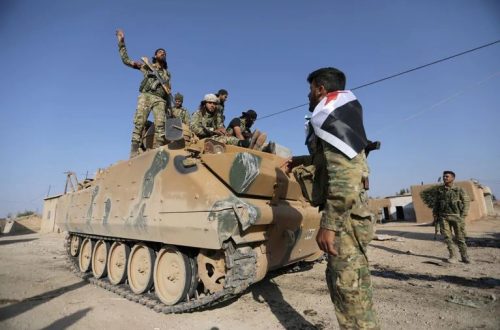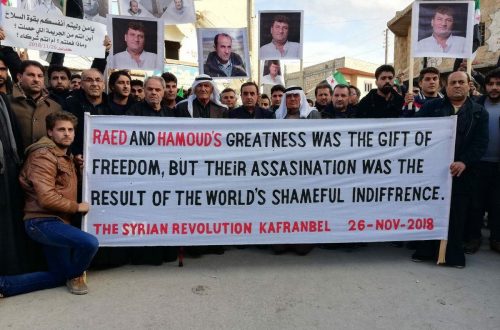Guest post by DaveM
With Idlib and Jisr al-Shughour falling in quick succession to a coalition of Syrian rebels of which Islamist groups Ahrar Ash-Sham and Al Qaeda’s Syrian wing Jebhat An Nusra form the main components, some observers are starting to wonder if this is the start of a trend which may result in Assad eventually losing his grip on power.
The Syrian army is looking very shaky, and footage has leaked of Colonel Soheil “The Tiger” Hassan calling for more ammunition as the rebels swept their way towards Idlib, which they eventually took and are threatening to take the Alawite heartland of Latakia.
Four years after the start of the Syrian uprising and 200,000 dead later, an unnamed US official told the New York Times that “The trend lines for Assad are bad and getting worse,” although he cautioned against a tipping point having been reached.
Though this hasn’t stopped Al Jazeera calling it.
“The Syrian regime is at a critical stage and this time it may not be able to emerge from it intact as has happened on previous occasions where Iranian support and Hezbollah have saved it.
“Here the analyses of observers and experts have intersected on one fact, something which may happen at any moment, and that’s the regime falling quicker than expected due to the latest developments both politically and those on the battlefield.
“For the armed opposition, specifically Jaish Al Fateh [“the Army of Conquest”] which is made up of a number of factions [note: a major one is Jebhat An Nusra /Al Qaeda] has achieved a number of successive strategic victories which the regime itself doesn’t deny. After it took Idlib, following a fierce battle Jisr Ash Shugur fell to it. And this battle led not just to the fall of the regime’s forces but to them fleeing en masse prior to the opposition also taking over the Qarmeed military base, the regime’s most important site in the area.
“Possibly even more important than this is that the opposition’s victories in the regions could make the fighters head towards the coastal town of Latakia and the mountainous areas adjacent to it. The regime has set up a cordon around them so as to make it difficult to confront. However this is what’s taking place at Al-Ghab plain
“And parallel to that the regime has also suffered losses on the southern front where opposition forces in Deraa province were able to take control of the town of Bosra Sham, and the Nasib crossing which is the last one connecting Damascus with Jordan.
“And the regime’s [military] campaign on Aleppo carried out with support from Hezbollah and other militias didn’t achieve its desired goals.
“The Washington Post considers that Assad’s regime is facing a greater risk [of collapse] than it did at the beginning of the revolution and that it is tottering under the pressure of four years of war. And in addition to this there’s been the deterioration of the situation in the regime’s inner circle. This took place previously in which a number of important personalities from the Assad family died in horrible circumstances along with others being stripped of their posts. Then there was the mysterious death of Rustom Ghazali, the head of political security, after his clash with Rafiq Shahadah, the head of military security.
“It’s now become pretty much confirmed that the Syrian regime has lost the initiative and is no longer able to take back the areas which it has lost. And that’s not to mention the military collapse which throws up a political significance. This is that it ends the idea that the regime is victorious. This idea was constantly being promoted so the regime could present itself to the major powers as being able to fight ISIS and similar groups.
“And even if the Minister of Defence’s visit to Tehran is successful in getting more men, war materials and money, even the most optimistic about the strength of the Regime consider that what’s happening today is the beginning of the end.”
This is a sentiment which has been echoed by the Daily Star’s Michael Young who describes Assad’s regime as being on “life support”.
And it does look very bad indeed for Assad, as along with reports of low morale in the army and the killing of the former head of Syria’s military intelligence in Lebanon Rustom Ghazaleh, reports have emerged of infighting among Assad loyalists in Homs.
Additionally Al Arabiya reports that Hezbollah, which has played a central role in propping up Assad’s regime, is suffering from a drop in the number of people joining its ranks to fight in Syria.
“With the war in Syria continuing and with Hezbollah’s determination for over three years now in taking part in the country’s battlefields, the organisation is now starting to face a shortfall in the number of fighters.”
Journalist Ali Al Amin: “In my estimation, Hezbollah extending itself outside Lebanon and stretching into Syria all the way to Aleppo, means that it will have to attempt to use [a large] number of fighters from everywhere [it can].”
“Website ‘The New Lebanon’ mentions that Hezbollah had resorted to opening the door of recruitment to 600 new members under the heading ‘The Contract’ in the Bekka region alone. However it was in for a surprise as no more than 150 people signed up. And this despite the fact that the Bekka forms a reservoir of human support for the Party.
“In response to this the Party formed an investigative committee to find the reason behind this rebellion and to why supporters and individuals called up are refraining from joining the Party’s combat formations. And this is happening despite the high levels of financial remuneration which the Party pays to the fighters.
“The information states that reasons for this drop [in the numbers] are partly due to the emergence of a popular mood which is against the Party getting embroiled in the region’s events and specifically those of Syria.”
Ali Al Amin: “[This is] the beginning of focusing in the general awareness that we will store this trust in order to defend and not in order to attack.”
“Observers link the Party’s crisis in recruiting people with its attempts to replace its fighters with underage fighters in order to fill the deficiency in its numbers, and this was mentioned by the website Al Janoubia.
“The behaviour of the leaders in the Bekka and the lavish lifestyles which they lead at a time when members of the Party are getting killed and injured in its battles outside Lebanon’s borders is causing a state of unease in the Party.
“This crisis is arriving at the gates of the battle talking place at Qalamoun in Syria which Hezbollah is getting ready for after the snow melts from the top of the mountains in the region.”
So with losses in Idlib, Jisr al-Shughour, regime infighting, the mysterious death of an influential figure such as Rustom Ghazali, Hizbullah suffering from lack of new recruits, Saudi rapprochement with Qatar and Turkey, the coalition of rebel groups, and no sign of the rebels giving up– surely it has to be game over for Assad?
Not so fast says Jonathan Spyer in the Jerusalem Post, who offers a more cautionary message, which is that we must not underestimate Iran’s refusal to let go of Syria.
[U]nlike the rebellion, the regime possesses strong and committed allies. Most importantly, Iran has been willing to mobilize its regional proxies and its own assets in order to offset Assad’s shortage of manpower. Hence, the prominent place of Lebanese Hezbollah fighters on the Syrian battlefield – along with Iraqi Shi’ite militiamen, local Alawite irregulars and Shi’ite volunteers from as far afield as Afghanistan.
There is no reason to believe that the well of potential volunteers from outside Syria has dried up.
As fewer Syrians enlist, it is likely that as in the past, their places will be filled by foreigners. To be sure, this means that the Assad side is today a mixed bag of mainly Shi’ite volunteers assembled by Tehran, rather than the army of a coherent state regime. But this does not make its defeat more likely.
Indeed, given the greater determination and cohesion the Iranians have shown throughout the region, when compared with the confused and flailing Sunnis and the largely absent West, the opposite might well be the case.
…….
[I]f the nuclear negotiations currently under way produce a deal to Iran’s liking on June 30, this is likely to improve the fortunes of the Assads. That is because the Islamic Republic will demand immediate sanctions relief. This will free up vast sums to flow into Iranian coffers– as much as $50 billion, according to one estimate.It may be assumed that these funds will be made available for a friend in need. Given the fecklessness of the Western approach to the negotiations and the desire to avoid conflict with Iran, it is quite possible that such a deal will emerge.
Recently Al Aan TV reported that Afghanis had been fighting for the Syrian regime and broadcast a confession from those captured by the Free Syrian Army during fighting in Busra al-Harir in the south of the country.
“Factions from the Free Syrian Army have captured a group of Afghani mercenaries who had been attempting to storm the region of Al-Lajah and the town of Busra al-Harir and were doing so as part of the Assad regime forces. The prisoners said that they came from Afghanistan to Iran prior to heading to Syria. They said that they’ve been offered a monthly salary of a two million Iranian Toman which is $700.
“Al Aan News correspondent said that the group of Afghanis were fighting within the Fatemiyoun Brigades which are affiliated with the Iranian Revolutionary Guards, a brigade whose name has recently become become prominent.”
Captive: “I am Haider Muhammedi from Mazar-i-Sharif in the Balkh province of Afghanistan. We went from Afghanistan to Iran and then to Syria. We came to Syria to protect the honourable shrines [such as the Sayeda Zainab Shrine]. When we were in Iran they told us they would give us 2 million Toman [$700]. Our leader in Syria is an Afghani citizen.
“I’m sending my greetings from Syria to my mother and father as we have been taken prisoner in Syria. [To my] father, my mother, my wife and my daughter, we’re in Syria. If you’re able to help us, we’re in Syria.”
What we’re now seeing is no longer an uprising against a murderous totalitarian state but instead a sectarian war between Sunni Islamic fundamentalists and what has become an Iranian proxy regime which isn’t afraid to use chemical weapons on its own population. There don’t appear to be many good guys left in this war– a war which is far from over.
In a recent editorial The Washington Post urged the US government to take advantage of the current shift of momentum or else we could witness a disaster. It warns:
The shift of momentum could create an opportunity for the United States and its allies to leverage the change of rulers in Syria that President Obama first endorsed nearly four years ago. But it could also lead to disaster, if the crumbling regime is replaced by the jihadist forces of the Islamic State or al-Qaeda, as already occurred in eastern Syria. In short, the battlefield developments add new urgency to the need for a coherent U.S. strategy.
Based on how Washington has been dealing with the Syrian crisis over the last four years and its aversion to getting involved, I can’t see this happening.


